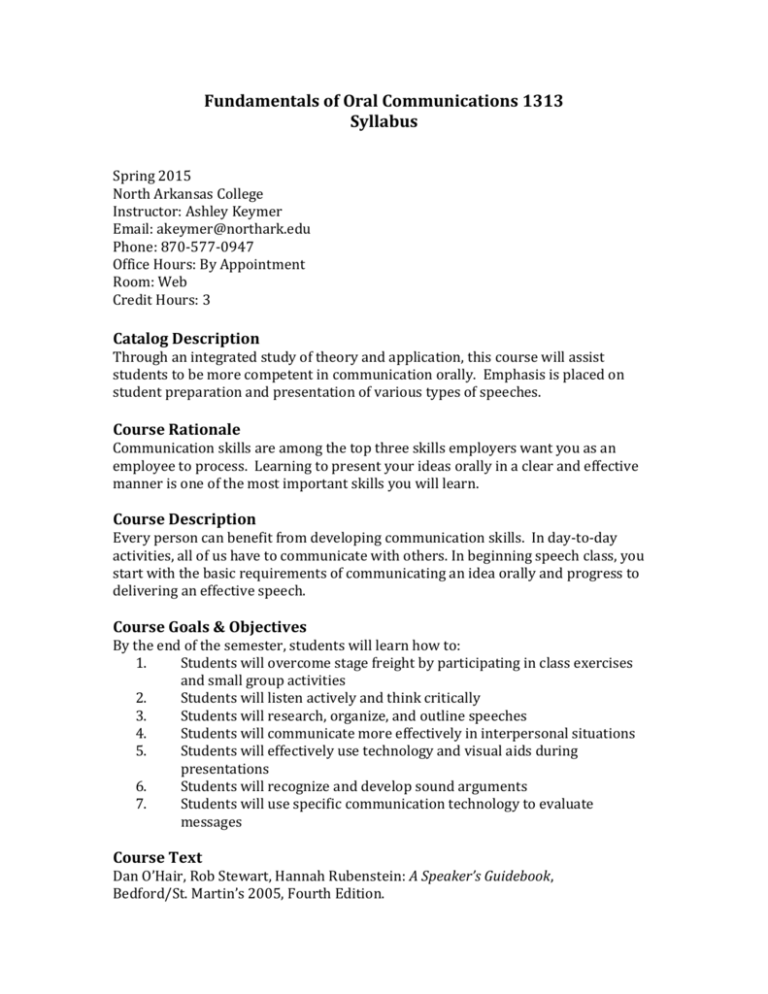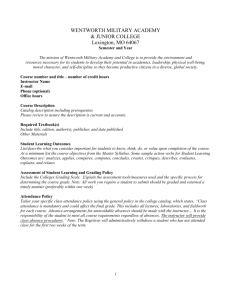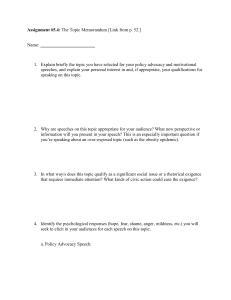Spring 2015 - Portal - North Arkansas College
advertisement

Fundamentals of Oral Communications 1313 Syllabus Spring 2015 North Arkansas College Instructor: Ashley Keymer Email: akeymer@northark.edu Phone: 870-577-0947 Office Hours: By Appointment Room: Web Credit Hours: 3 Catalog Description Through an integrated study of theory and application, this course will assist students to be more competent in communication orally. Emphasis is placed on student preparation and presentation of various types of speeches. Course Rationale Communication skills are among the top three skills employers want you as an employee to process. Learning to present your ideas orally in a clear and effective manner is one of the most important skills you will learn. Course Description Every person can benefit from developing communication skills. In day-to-day activities, all of us have to communicate with others. In beginning speech class, you start with the basic requirements of communicating an idea orally and progress to delivering an effective speech. Course Goals & Objectives By the end of the semester, students will learn how to: 1. Students will overcome stage freight by participating in class exercises and small group activities 2. Students will listen actively and think critically 3. Students will research, organize, and outline speeches 4. Students will communicate more effectively in interpersonal situations 5. Students will effectively use technology and visual aids during presentations 6. Students will recognize and develop sound arguments 7. Students will use specific communication technology to evaluate messages Course Text Dan O’Hair, Rob Stewart, Hannah Rubenstein: A Speaker’s Guidebook, Bedford/St. Martin’s 2005, Fourth Edition. Assignments & Requirements Every class is vital and essential material will be covered in every minute of each class. Once we have covered preliminary matters in the opening meetings, students will be performing speeches/presentations almost every class period. There is a great amount of research and work to this class if you approach it professionally and correctly you should be working on material everyday. We will be doing a great amount of in-class activities. I expect you to be “on your toes” prepared to perform and participate. Activities and participation is a vital part of your grade in this course. You must have a notebook specifically for this course to take notes with a pen or pencil each class period. Point System Required Speeches Informative Speech Demonstrative Speech Motivational Speech Persuasive Speech 5-6 minutes 5-6 minutes 9-10 minutes 9-10 minutes Required Speeches Term Sheets Term Exam Participation Assignments 400 Points 100 Points 100 Points 600 Points Total Points 1200 Points For all speeches and presentations you are free to choose the topics for all your speeches. I encourage creativity; however, I do not allow any topics, language or examples of rude, crude, vulgar, or offensive nature. Evaluation Procedures This course primarily focuses on audience and purpose awareness. All grading, therefore, will be based on your audience and purpose awareness (or lack thereof). Always remember to have the voice, tone, eye contact, etc. necessary for the type of communication you are engaged in. Such factors will then figure into your grade for each assignment, as they are essential to audience/purpose awareness. Grading Scale: 90-100%= 80-89%= 70-79%= 60-69%= 0-59%= A B C D F Late Assignment Policy As a rule, I do not accept late assignments. If you anticipate an absence on the day of your scheduled speech or presentation, you must talk to me to reschedule or make other arrangements. If you do not inform me and miss giving a speech or presentation, you will receive a zero for the missed assignment. Attendance Policy It is the responsibility of faculty members to advise their classes, in writing of their attendance and makeup policies. It is the student’s responsibility to discuss any absences and the possibility of makeup work with the instructor as soon as possible. Students are expected to attend all class meetings and officially withdraw from courses they are no longer attending. If you should stop attending, please process a drop slip. Regular attendance is necessary for the satisfactory completion of this course. The Humanities Division has set a departmental attendance policy. Only six hours of absence will be permitted in any course for any reason. A student who misses seven hours of class instruction must withdraw from the class. If that student fails to withdraw they will automatically receive an F for the course. There will be no exceptions to this rule. If you do have to miss class for any reason, it is your responsibility to contact and communicate with me. Tardiness Ten minutes late is an absence, no exceptions. Do not enter the class if a presentation is being given. When you come in five and ten minutes late it disrupts those who are already working. Be professional and give the other class members the same respect that you want when you are presenting. I understand sometimes it is almost unavoidable to be late to class, however, if a student is excessively tardy, I will record sufficient absences to account for the time missed. Provision for Changes in the Policy Statement/Syllabus I have the right to change the syllabus at any time. If changes do incur, I will announce them to the class. Tentative Schedule The class schedule will be depend on how many students are present, whether or not students are giving speeches/presentations individually or as a group, and what type of communication we are discussing. However, general ideas will be provided of what we will be covering each week. Academic Dishonesty: Academic fraud and dishonesty are defined on pages 34-35 of the student handbook. Any instructor who suspects that cheating or plagiarism has occurred will act in accordance with the guidelines contained in the Student Handbook. North Arkansas College’s commitment to academic achievement is supported by a strict but fair policy to protect academic integrity. This policy regards academic fraud and dishonesty as offenses requiring disciplinary action. Cheating Intentionally using or attempting to use unauthorized materials, information or study aids in any academic exercise. Facilitating Academic Dishonesty Intentionally or knowingly helping or attempting to help another commit an act of academic dishonesty. Test Tampering Intentionally gaining access to restricted test booklets, banks, questions, or answers before a test is given: or tampering with question or answers after a test is taken. Plagiarism Intentionally or knowingly representing the words and ideas of another as one’s own in any academic exercise. All worked is expected to be your own. Source materials must be cited properly within your speech. If you are caught plagiarizing, you will receive a “0” for the assignment and, likely, an F for the course. Accommodations for Students with Special Needs North Arkansas College complies with Section 504 of the Rehabilitation Act of 1973 and the Americans with Disabilities Act of 1990. Students with disabilities who need special accommodations should make their requests in the following way (1) talk to the instructor after class or during office hours about their disability or special need related to classroom work; and/or (2) contact Student Support Services in Room M149 or call 870-391-3338 and ask to speak to Kim Brecklein. Syllabus Acknowledgement The syllabus acknowledgment must be returned to the instructor.







